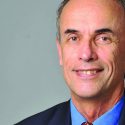
Charlie Rowland has taken on some of the highest, toughest cycling roads in the world – from the Alps to the Pyrenees to the Rockies.
But now he’s saddling up for what might be the most challenging ride of his life, namely working on the board of directors for two companies targeting their efforts in the war on the COVID-19 threat.
Rowland, a Yardley native who now calls Furlong home, recently directed development for an organization creating a drug to treat lupus.
The difference now is, the timeline for trying to stop the coronavirus pandemic is much more urgent.
Some estimates put the possible eventual death toll in the United States as high as 250,000 – and that’s if everyone continues to practice safe social distancing and other preventive measures.
“It’s people’s lives,’’ said Rowland, who is currently self-quarantining at a vacation home in Park City, Utah. “There are some people now who are really concerned about ‘can they make their next rent payment, buy food for the kids, what’s going to happen to me when this is over? Am I going to get my job back?’
“So it’s more than just those who are directly affected by the virus. This is something unprecedented in our lifetime.’’
As a board member for Generation Bio and Nabriva Therapeutics, Rowland has a hand in steering the strategic direction of the companies.
Generation Bio is working with a third company, Vir Biotechnology, to develop an antibody therapy that the companies hope may create long-lasting protection against the virus that causes COVID-19.
They are at the early stages of development and caution that their approach will not lead to treatments immediately, but they hope it could be an important method for stopping the virus should it resurface in the future.
“This collaboration is aimed at developing a therapy that may provide long-lasting protection against a potential second wave of the pandemic,” Rowland said.
The collaboration is taking a different path than some of the other approaches being tested against COVID-19, such as these:
>Drugs already out there being used to treat other diseases are being tested against the coronavirus and could be ready for public use in a month or so.
>Then there is a new class of antivirals that are specifically developed for this virus and they could be moved into the clinic in the May-June time frame, with possible approved use in the fall.
>Finally, there are vaccines but they won’t be ready until summer-fall of 2021 because they must pass safety and efficacy tests through clinical trials.
The collaboration between Generation Bio and Vir is different. It’s not an antiviral and it’s not a vaccine. Instead, the idea is to deliver genetic code to patients’ cells that enable them to churn out antibodies against the virus. If it succeeds, the patients could have protection against the virus for many years.
“Our hope is that we can leverage Generation Bio’s gene therapy platform to, in a sense, turn the body’s own liver cells into tiny factories, pumping out protective antibodies against the virus,” Rowland said.
“It’s skipping the vaccine part. and simply delivering the antibodies. That’s never been done before. We’re still at the very early stage, but our hope is that we could, down the road, potentially alleviate the need for a vaccine at all.’’
Rowland also serves on the board of Nabriva Therapeutics, which is developing new agents to treat the secondary bacterial infections that are common in patients with COVID-19.
Nabriva’s drug, known as lefamulin, does not treat COVID-19 directly, but treats serious and common complications that can lead to death. Due to the global surge in patients, traditional drugs to treat these secondary infections are in short supply.
Secondary bacterial infections are common (15-27 percent) in COVID-19 patients and the mortality rate in these patients is 50 percent.
Rowland competes in cycle races all over Europe and around the world. The pandemic has caused the elimination of all competition for the first half of this calendar year and probably well beyond.
Just a guess, but the Tour de France (early July) could even be in jeopardy. The cyclists themselves are not the problem – it’s the large crowds of spectators which might be dangerous to themselves.
Big races like the ones in Milan-San Remo and Tour of Flanders are off the schedule.
Perhaps one silver lining to all this is Rowland doesn’t have to do any business travel and can just concentrate on cycling around the Wasatch Mountains in Utah for his training. All the company stuff can be done remote by teleconference.
“I’m actually in pretty good shape,’’ Rowland said. “But I don’t know if I will have an event to ride in the entire year.’’
A while back, Rowland attempted a hiking ascent of Mount Kilimanjaro in Tanzania (at 19,341 feet the tallest free-standing mountain in Africa) but was thwarted from reaching the summit when he took ill at 17,000 feet.
Undeterred, he went back recently and this time he made it.
“I was with a group of guys and I made it to the top 45 minutes before the rest of them,’’ he proudly proclaimed.
Now if he can just help achieve that ahead-of-time performance on another kind of mountain.


Be the first to comment